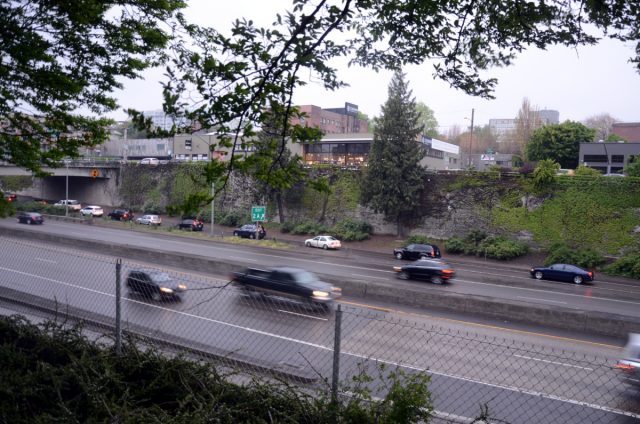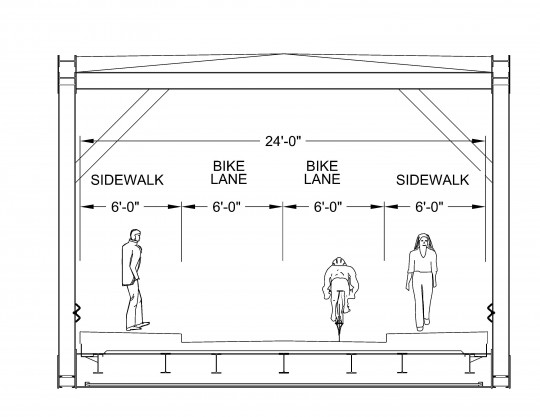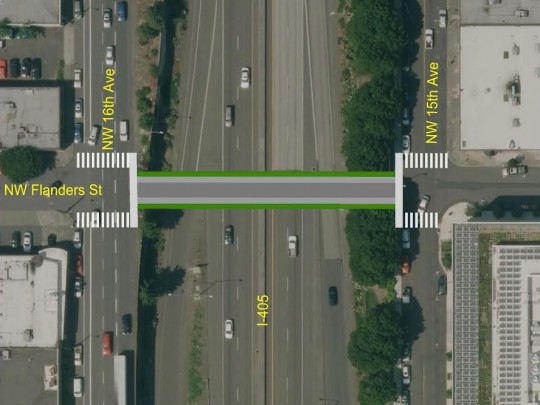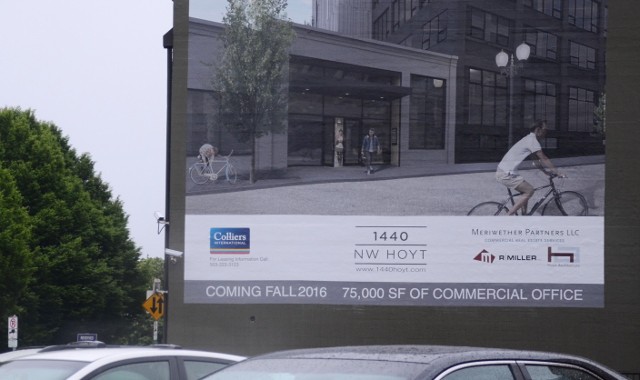
(Photos: M. Andersen/BikePortland)
A new biking-walking bridge across Interstate 405 at Northwest Flanders has probably made the cut for funding, a state official said Wednesday.
The approximately 250-foot-long, 24-foot-wide bridge would become by far the most comfortable crossing of Interstate 405, an alternative to the existing crossings at Everett, Glisan and Couch. Paired with a proposed neighborhood greenway on Flanders from the Steel Bridge west to 24th Avenue, the span is expected to carry 9,100 trips per day.
That figure, which includes both biking and walking trips, is higher than the summertime bike counts across the Hawthorne Bridge and about five times the daily bike ridership so far on Tilikum Crossing.
We wrote yesterday that the bridge would be an important connection for Biketown riders in part of the city that is about to become one of North America’s best-served neighborhoods for public bike sharing.
Barring unforseen events, construction of the new bridge could begin in April 2018 and finish by May 2019.
Final statewide committee scored bridge highly
The Portland Bureau of Transportation has pledged $3 million of its revenue from development fees for the crossing. It’s been looking to the state’s lottery-funded Connect Oregon program for the remaining $2.9 million.
In March, a committee of biking-walking experts from around the state ranked Flanders Crossing third of 22 such projects statewide. But in May, a Portland-area committee scored it more poorly, leaving its fate largely up to Connect Oregon’s final review committee, which met Tuesday to create a scoring of its own.
Oregon Department of Transportation staffer Scott Turnoy, the staffer managing Connect Oregon, said Wednesday that the final review committee had scored Flanders “in the top half” of projects and that it would likely make the cut for state funding.
Advertisement
“I was a bit surprised and very happy,” said Aaron Deas, a lobbyist for TriMet who represented transit interests on the final review committee, in a text message Wednesday. “What was surprising about the Flanders bridge was that there were no questions, even with the big price tag. But it did rank highly.”
The Oregon Transportation Commission must still make the final funding decision at its July 21 meeting. But barring an unexpected turn of events, that board is likely to defer to the Connect Oregon committee’s list.
Turnoy said he couldn’t release the final review committee’s full ranking yet and wouldn’t know until tomorrow when it’ll be made public. Also competing for funds are a fix for the Naito Gap in inner northwest Portland and trail segments in southwest Portland, Wilsonville, Milwaukie, Gresham and Tigard.
If it’s funded as expected by the Oregon Transportation Commission, Flanders Crossing will be Portland’s biggest payoff yet from a state law, unexpectedly won by the Bicycle Transportation Alliance in 2013, that made biking and walking projects eligible for the Connect Oregon program.
Project drew endorsements from many nearby employers
City transportation spokesman Dylan Rivera called the apparent success of the bridge a “game-changing boost” for biking in northwest Portland, which has been rapidly adding both jobs and homes.
“Every week we read another report of a tech company moving to the downtown area saying bike lanes, food carts and public transit service are a key reason they can attract talented people.”
— Dylan Rivera, Portland Bureau of Transportation
“Every week we read another report of a tech company moving to the downtown area saying bike lanes, food carts and public transit service are a key reason they can attract talented people,” Rivera said. “We think that’s a testament to the investment Portland has made over the decades to bike access.”
To support its application to Connect Oregon, which has a mandate to invest in non-automotive projects that grow the state’s economy, the city transportation bureau gathered letters of support from nearby employers like Vestas, Gerding Edlen and Airbnb.
The city also had to overcome comments from state staffers, who observed that the city has a backlog of transportation projects funded by the state and Metro but not yet on the ground. Those comments prompted a response letter from Portland Transportation Director Leah Treat, who said the city would be able to start work promptly on Flanders Crossing.
“We’d like to thank the statewide bike-ped committee for their deep understanding of the importance of key active transportation investments in Portland that can benefit the entire state,” Rivera said Wednesday. “This is a testament to the strong business support for bicycling in Portland and the importance of bike access to grow our economy in the coming decades.”
— Michael Andersen, (503) 333-7824 – michael@bikeportland.org
Our work is supported by subscribers. Please become one today.





